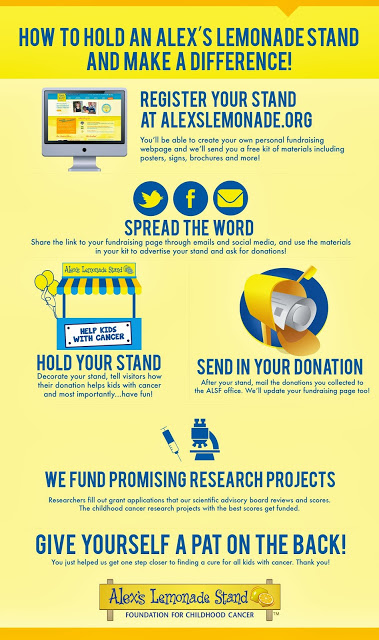So you hold a lemonade stand, or maybe you visit one and drop a donation into the bucket, the money gets sent in to Alex's Lemonade Stand Foundation...but then what? How does this end up helping kids with cancer? With the guidance of our expert Scientific Advisory Board, these donations help to fund grants awarded to researchers who have submitted promising projects searching for better treatments and cures for childhood cancers. And...it's working. Below are a few amazing impact stories that your donations are helping to make possible.

Remember
Edie Gilger? Edie was featured in a great
piece on CBS Sunday Morning in early June that detailed how a clinical trial at the Children's Hospital of Philadelphia using a drug that is effective in treating lung cancer in adults, eradicated cancer in a select group of children with lymphoma. For 7 out of 8 children in the trial - there is no trace of their cancer, including Edie. ALSF provided funding to the research team that allowed them to develop the breakthrough trial.
We're thrilled to share that early results from a clinical trial at Duke University Medical Center led in part by ALSF grantee
Matthias Gromeier, MD has found that a modified version of the poliovirus is proving effective in treating patients with glioblastoma. For Stephanie Lipscomb, the first patient enrolled in the trial, the study has been life altering. After her cancer recurred, Stephanie agreed to take part in the trial where a modified version of the poliovirus was injected through a catheter into her brain. She responded beautifully and her lime sized tumor shrank to the size of a pea. Stephanie just returned to nursing school this fall where she plans to study oncology. ALSF funds supported research that contributed to making this clinical trial possible.
 |
Dr. Heisterkamp and her colleague
John Groffen, PhD. |
In today's funding environment, which is becoming increasingly more competitive as federal funding for childhood cancer continues to decrease, sometimes researchers just need a lifeline as they search or reapply for funding. A great example of this is Nora Heisterkamp, PhD from the Children's Hospital of Los Angeles. Dr. Heisterkamp has been trying to understand how acute lymphoblastic leukemia (ALL) cells, become drug-resistant. Her team recently found that when ALL cells become drug-resistant, they contain high levels of modified sialic acid and when the modification was removed, the ALL cells were killed. Even better - it had no effect on healthy cells. Although Dr. Heisterkamp has been studying sialic acid modification for quite some time, the project was in jeopardy when she did not receive funding from the National Institutes of Health (NIH) to continue the project. She applied for an ALSF Bridge Grant and was awarded funding to keep the project on track, while she reapplied to the NIH. In addition to the promising results of the research, Dr. Heisterkamp recently found out that she was awarded NIH funding for the project again. Excellent!


